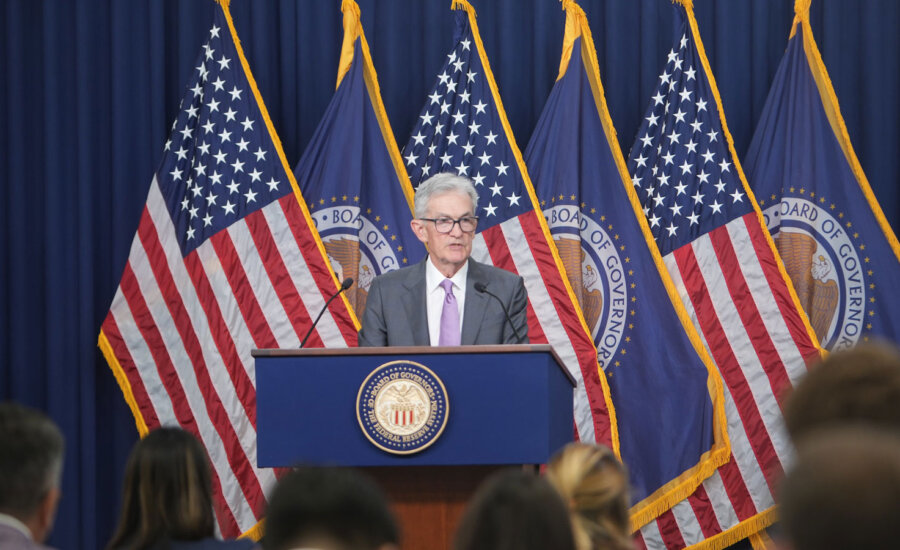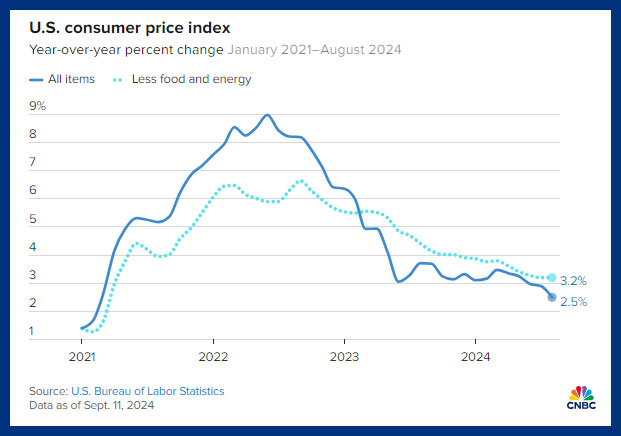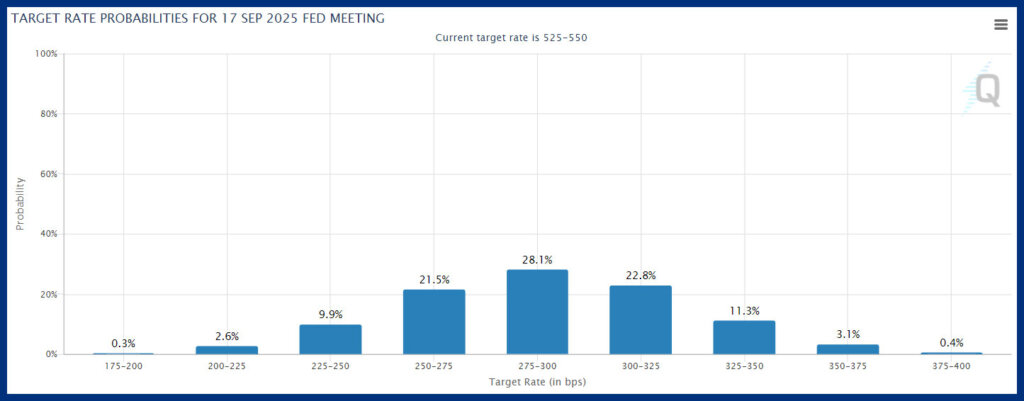Making sense of the markets this week: September 15, 2024
Inflation’s down, a nuclear-powered Oracle rises, Empire and Dollarama thrive, and the S&P 500 welcomes new family members.
Advertisement
Inflation’s down, a nuclear-powered Oracle rises, Empire and Dollarama thrive, and the S&P 500 welcomes new family members.

Kyle Prevost, creator of 4 Steps to a Worry-Free Retirement, Canada’s DIY retirement planning course, shares financial headlines and offers context for Canadian investors.
In the U.S. on Wednesday, the Consumer Price Index (CPI) announcement from the U.S. Bureau of Labor Statistics revealed that August’s costs and services had increased at an annualized rate of just 2.5%. This continues the momentum toward a more “normal” inflation rate and gives the U.S. Federal Reserve some breathing room to cut rates in pursuit of addressing rising unemployment numbers.

Futures markets are now pricing in an 86% chance that there will be a 0.25% rate cut from the American central bank next week, and a 14% chance there will be a 0.50% cut.
Meanwhile, the long-term rate cut predictions are showing roughly an 85% chance that we may see at least a 2% cut over the next year—with the target range going from the current 5.25% to 5.50%, to 3% to 3.25% or even lower.


Get up to 3.50% interest on your savings without any fees.

Lock in your deposit and earn a guaranteed interest rate of 3.65%.

Earn 4.25% for 4 months on eligible deposits up to $100k. Offer ends September 30, 2025.
MoneySense is an award-winning magazine, helping Canadians navigate money matters since 1999. Our editorial team of trained journalists works closely with leading personal finance experts in Canada. To help you find the best financial products, we compare the offerings from over 12 major institutions, including banks, credit unions and card issuers. Learn more about our advertising and trusted partners.
While net earnings for Sobeys and IGA parent company Empire were down year over year, shareholders were still happy with the earnings report on Thursday. Share prices were up 5.59% and the stock is up more than 16% year to date.
Here’s a breakdown of the results this week.
Empire CEO Michael Medline highlighted the growing FreshCo brand as a positive growth story for the company. He went on to say that the company’s data showed improving consumer sentiment and smaller declines in average grocery basket size.
Empire has more exposure to the full-service model of grocery stores than more cost-conscious discount locations, when compared to competitors like Loblaws.
Last week, I wrote about how Dollarama had substantially outperformed U.S. rivals. This week, though, we’re seeing the trend continue. Dollarama shares were up more than 8% after Wednesday’s earnings report.
For more information on Empire and Dollarama you can check out Dollarama’s second quarter results, Empire’s earning report, and my article on investing in Canadian retail stocks at MillionDollarJourney.com.
Tuesday’s earnings call was the best day that Oracle shareholders have seen in a while.
All figures in U.S. currency in this section.
Share prices rose more than 13% after the tech giant showed profits that were up nearly 20% from last year. Revenues across the company’s cloud services division continue to increase. And CEO Safra Catz said, “I will say that demand is still outstripping supply. But I can live with that.”
Founder Larry Ellison (who recently passed Mark Zuckerberg to become the second richest person in the world) excitedly predicted that Oracle would one day operate more than 2,000 data centres, which is up from the 162 today. The current project that he highlighted is a massive data centre that will use three modular nuclear reactors to produce the needed gigawatts of electricity.
In other U.S. stock market news, Trump Media and Technology Group (DJT/NASDAQ) investors face a big decision this week. The stock plummeted from highs of $66 per share on March 27, to $16.56 after the debate on Wednesday. Don’t say we didn’t warn you.
That’s not the worst news for DJT investors though. Next week, a potentially crippling event occurs: the entity that owns 57% of the shares can sell the stock for the first time. If it were to sell all its shares (in order to get as much money as possible out of a business venture that loses millions of dollars every month), the share price would tank.
What is the “entity”? It’s actually a question of who not what: Donald Trump.
Even at reduced share price levels, Trump’s slice of Truth Social is worth about $1.9 billion. It’s not like he needs money for pressing issues or anything like that…
In other big events to look forward to, September 23 will see major U.S. market indices experience a reweighting. Given that trillions of dollars are now passively invested into indice-based index funds, whether your company is a member of a specific index or not can make a big difference in its share price. That said, these indice moves are largely anticipated by the market, so a lot of the value movement has already been priced in.
This quarter, Palantir Technologies, Dell Technologies and Erie Indemnity will replace American Airlines Group, Etsy and Bio-Rad Laboratories in the S&P 500 list. The moves are the inevitable result of the growing use of the products and services from large tech companies.
Most notably, Palantir’s share price is up more than 75% this year, as the data analysis company believes it will grow substantially thanks to demand for its AI tools. Even good ol’ Dell—forever branded in my mind with this commercial “Dude, You’re Getting a Dell!”—grew thanks to increased revenues from its new built-for-AI servers.
To make the S&P 500 cut, companies must have a market cap of USD$18 billion, as well as meet (undisclosed) standards for profitability, liquidity and share-float. With Vanguard’s S&P 500 ETF (VOO/NYSE) taking in more than USD$54billion in new fund inflows during the first seven months of 2024, speculation over which companies will drop into and out of the index will likely become more important in the years to come.
That said, if you consider that the biggest company in the S&P 500, Apple, is more than 43 times larger than Palantir, a $100 investment in VOO would mean about $6.89 of your money would go to Apple, and only $0.16 would go to Palantir. So, I wouldn’t worry too much about losing out on Etsy or American Airlines, as they are a very small slice of the index pie anyway.
Apple hoped to make big waves with its new product launch this week for various iPhone 16 models, but judging by the tepid (flat) share price movement, the new iPhones didn’t cause a ripple. Pre-orders begin Friday, September 13. At the same time, perhaps “steady as she goes” is OK for the biggest company in the world.
Share this article Share on Facebook Share on Twitter Share on Linkedin Share on Reddit Share on Email